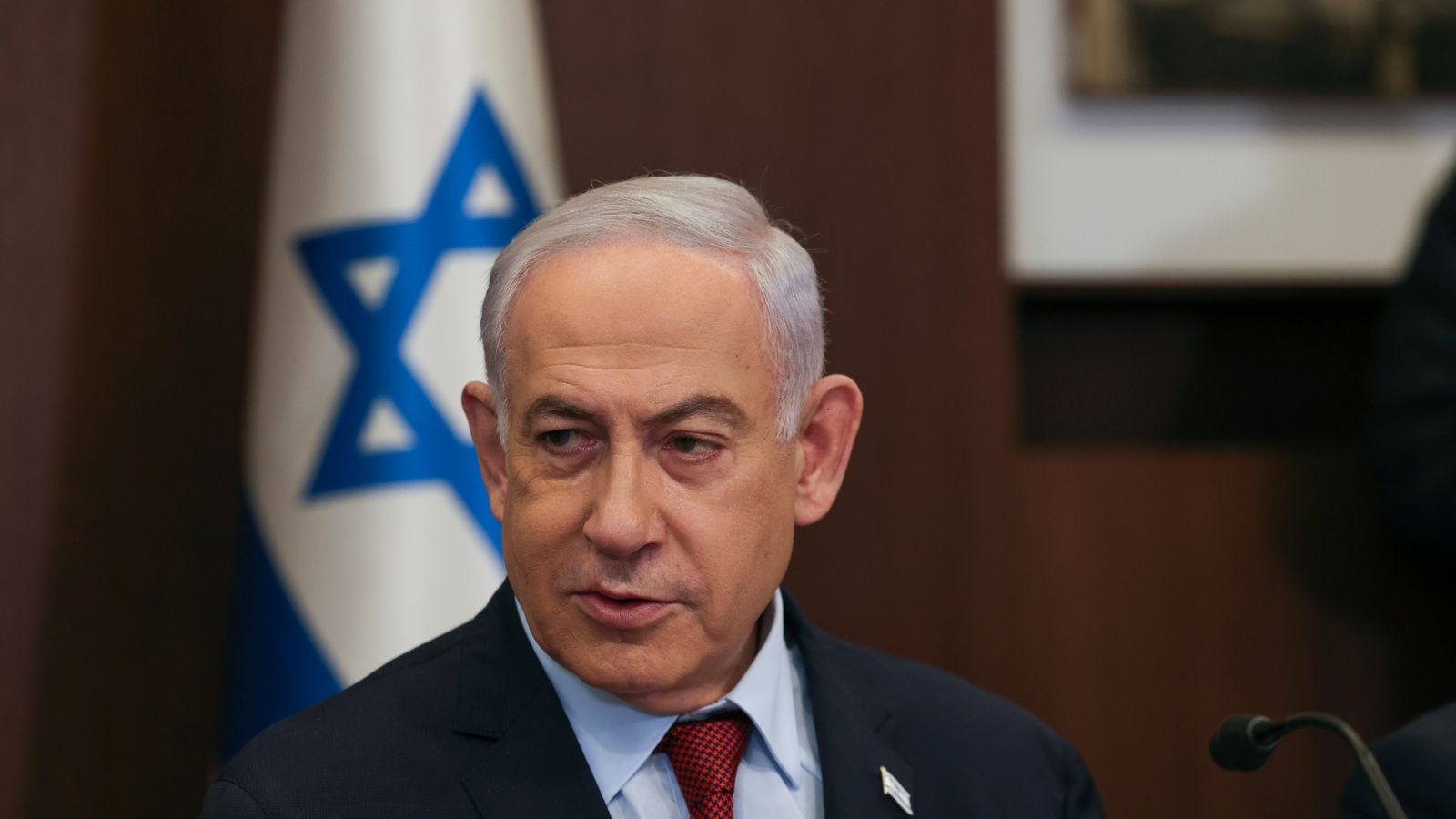Benjamin Netanyahu is openly defying the US – and they want him gone


The gulf between the US and the Israeli government visions for “the day after” in Gaza seems to be widening by the day.
In his Saturday news conference, Israeli Prime Minister Benjamin Netanyahu dismissed, again, a two-state solution and insisted Israel will have enduring security control in Gaza.
In doing so, he undermined the alliance through which America is backing Israel’s military operation in Gaza.
The Biden administration has repeatedly defined its backing of Israel as being to support its right to self-defence by eradicating Hamas in order to establish a viable pathway to two states.
Follow latest: Three Israeli hostages killed mistakenly by IDF
Contradictions over ‘the day after’
America’s National Security Advisor Jake Sullivan has just left Israel where we are told he reiterated America’s desire for a Palestinian/Arab-led security structure in Gaza when the war is over, and for the establishment of a “two-state solution” soon thereafter.
Mr Sullivan talked of a Palestinian-led “nucleus” for the security question in Gaza and even discussed West Bank-based Palestinian units that could have a key role.
A senior US administration official said late on Thursday night after Sullivan’s meeting with Netanyahu: “There are a number of security personnel linked to the Palestinian Authority, which we think might be able to provide some sort of a nucleus in the many months following the overall military campaign, but this is something we are discussing with the Palestinians and with the Israelis, and with regional partners…”
Advertisement
Please use Chrome browser for a more accessible video player
2:36
Signs of US-Israel rift over Gaza
The official also insisted repeatedly that President Biden’s view was that the only option for the future was a two-state solution with the establishment of a Palestinian state in Gaza and the West Bank.
The US official, on a background call with journalists, described the US vision as “…the type of future that everybody wants to see which is a path, a pathway ultimately, to a viable, two-state solution in which Israel’s security is guaranteed and the aspirations of the Palestinian people can be met.”
And yet this weekend, not only has the Israeli Prime Minister brazenly lauded his own efforts to prevent a Palestinian State over the years, but he is insisting that Israel will have enduring security control over Gaza.
“Nobody else can ensure that there will be a peaceful regime,” Netanyahu said.
He is repeating messages his ministers and ambassadors have been issuing, rejecting the two-state solution. Netanyahu has often danced around the issue giving vague definitions of what it would look like.
Please use Chrome browser for a more accessible video player

3:00
Analysis: Two-state solution rejected
The point now is this: at the very moment where alignment is required, and where it’s surely important for the messaging from the top of the Israeli government to match that at the top of the American government, Netanyahu is choosing instead to be provocatively contrary.
Indeed, this past week, I asked US State Department spokesman Matt Miller about the Israeli Ambassador to the UK’s rejection of the two-state solution.
His response suggested he thought she was an outlier and that there were a variety of views. Clearly that variety doesn’t stretch to the man running the war which America is fuelling.
New leaders
Ultimately American policy relies on an urgent change at the top of both the Israeli and the Palestinian leadership.
For Israel, the Americans want Netanyahu out. It’s telling that Sullivan saw opposition leader Benny Gantz for a lengthy meeting on Thursday.
Click to subscribe to the Sky News Daily wherever you get your podcasts
Netanyahu will surely do all he can to hang on, largely to avoid a reckoning over the failures which led to the 7 October nightmare. He’d probably be glad to see his old pal Donald Trump back in the White House too. And so the master of political manoeuvring will try to hang on.
As for the Palestinians? Well, the Americans talk about a “revitalised Palestinian Authority” capable of running Gaza. What they actually mean by that is the retirement of aging and deeply unpopular Palestinian President Mahmoud Abbas. They want a younger and more visionary leader to replace him. But who, and how?
Read more:
David Cameron calls for lasting peace piling more pressure on Netanyahu
Israel’s objective is not limited to ‘solving the Hamas problem’ – analysis
A prize needed
The Israelis are likely to focus more on the “day after” in Gaza once they have demonstrated some strategic success on the battlefield. They have razed the strip and nearly 20,000 people are dead. But the Hamas leadership remains at large. Netanyahu needs a “prize” so he can wind back the brutal war.
But the longer the war drags on, the harder the “day after” will be to mould. With the shock and pain of the last 70 days, reconciliation and coexistence firmly feel more distant than ever for this region.